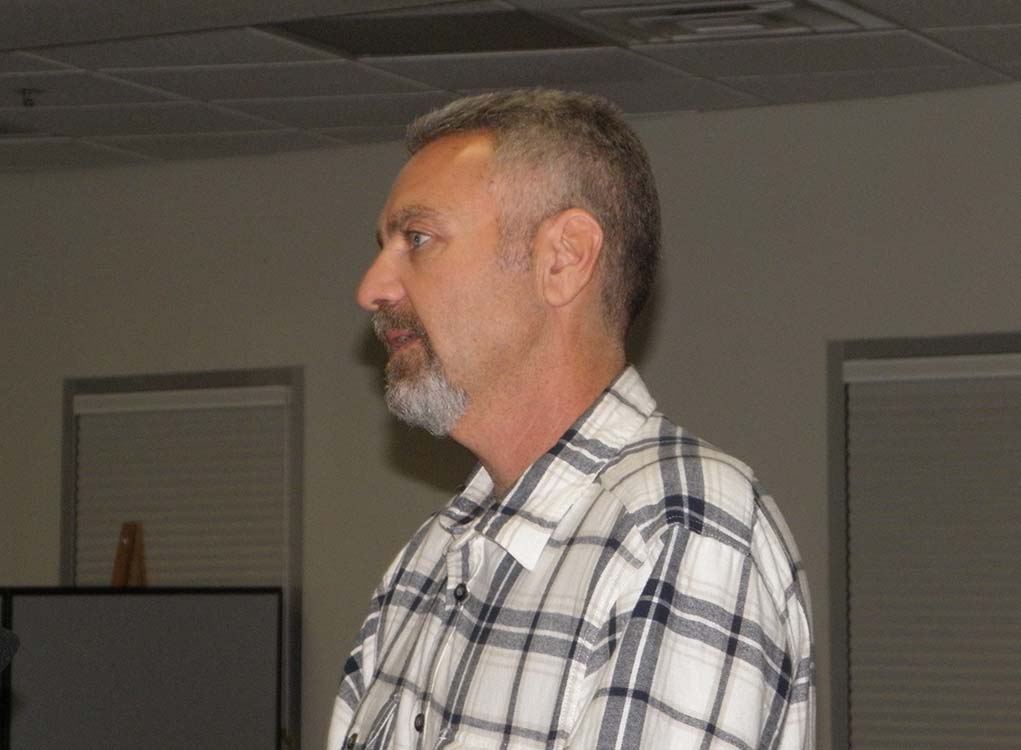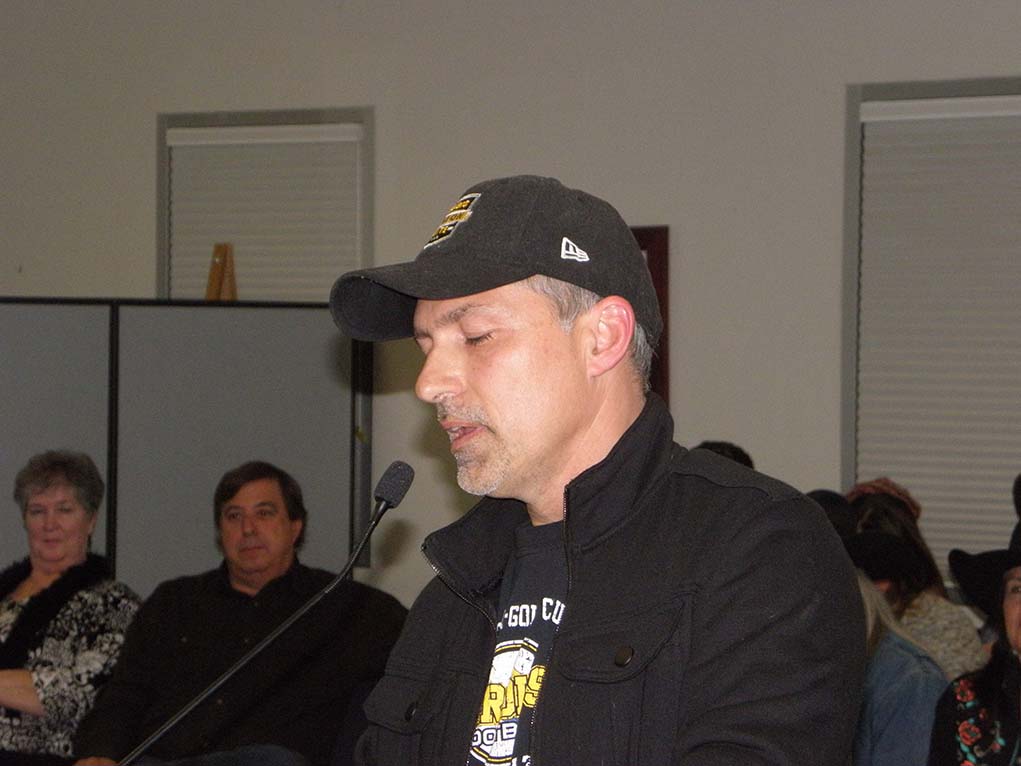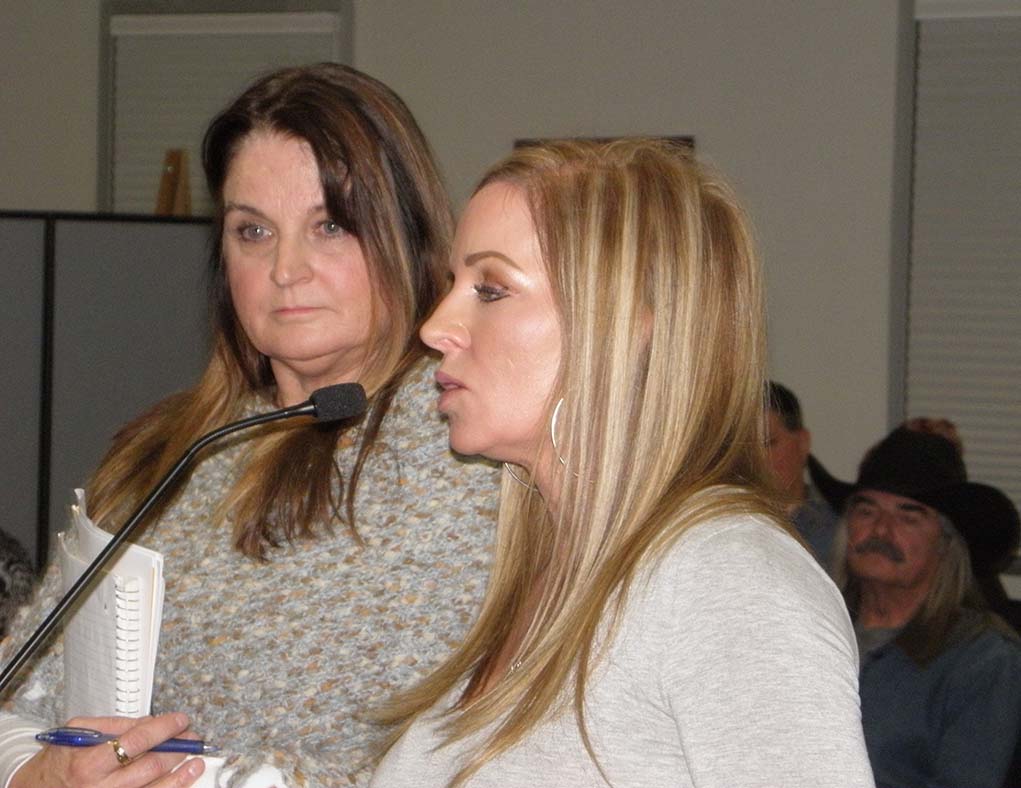CAVE CREEK – Marc Peagler spoke about agenda item number five, addressing the ticket surcharge proposed by the town for the Cave Creek Pro Rodeo (CCPR), during Call to the Public, stating it was a school night and he might not be able to keep his son up as late as the agenda item might run.
Peagler said he couldn’t think of any ticketed event, whether it was a sports event or concert, that didn’t charge a facility fee.
Peagler suggested the town let the Cave Creek Merchants and Events Association take back the Taste of Cave Creek event, which he said would free up that money to put toward the rodeo.
Katya Kincel said her comments were about the “circus tent” at the corner of Cave Creek and School House roads.
Citing town code, Kincel claimed the temporary use permit for the structure should only be issued in conjunction with a building permit and would require going through the planning commission for review.
Town Manager Peter Jankowski said permitting for the temporary structure is under the building and fire code and the town removed it from the zoning code years ago.
Associate Planner Luke Kautzman said the temporary use section was removed in 2011 because it was considered redundant under the building and safety code.
Building Official Mike Baxley also explained how the structure fell under the building code’s temporary use section and constituted a temporary structure.
Mayor Ernie Bunch finally cut the dialogue off since the item was not on the agenda for discussion.
Councilman Thomas McGuire announced the passing of former Councilman and Vice Mayor Ralph Mozillo.
Jankowski provided a brief update on the status of water service deposits and stated if a property owner was in good standing no deposit would be required but said they would have to pay a deposit if they defaulted.
Ashley Shiwarski from Utilities Service Partners was there to ask council to authorize a marketing license agreement so they could offer warranty service protection to the town’s utility customers for water, sewer and in-home plumbing lines.
Shiwarski said the voluntary program addresses homeowners’ aging infrastructure at no cost to the town and raises awareness to let homeowners know they’re responsible for repairing line breaks on their property.
She said there were three separate programs, water, sewer and in-home, in which homeowners could enroll for only a few dollars a month per program, which uses local, vetted contractors for all repairs.
The monthly fee is $5.75 for water, $7.75 for sewer and $6.99 for in-home plumbing, which covers any water, sewer or drain lines and the town would receive a small revenue stream of $0.50 per month, per service, per household.
Shiwarski said the rates may never be increased by more than $0.50 per year.
She said they do three separate direct mail campaigns per year, one for each program and are currently partnered with over 400 municipalities across the United States and 17 in Arizona.
She said septic systems and wells are not currently covered.
Councilwoman Eileen Wright asked if the mailers were on the town’s letterhead.
Shiwarski said the town’s name does appear on the letters and they would be, in essence, entering into a marketing agreement with the town.
When asked if they were licensed to sell insurance, Shiwarski explained they were not an insurance company but a warranty service.
Councilman David Smith moved to approve the agreement and said it seemed like a rational thing for the town.
Councilwoman Susan Clancy seconded the motion.
Wright said she didn’t think it was right for the town to endorse the program because it places the town’s reputation on the line and stated, “Our reputation is very important.”
Bunch said it was just like a home warranty program.
Council passed the motion by a vote of 6-1 with Wright dissenting.
Tony Geiger, chairman of the water advisory committee, provided council with an update on the progress of the utility rate study group.
He said they needed three items from the town, which included separate capital improvement plans (CIP) for each of the three utilities and the number of accounts in each of the rate tiers for water.
Geiger said the rate study group had its first meeting on Aug. 3 and its second meeting on Sept. 7, after which the town committed to providing the data needed within 60 days.

However, Geiger stated they were going to have flawed data because “the town has not kept good records.”
Geiger said the data they need will be available by the Jan. 17 council meeting, stating the CIP is very important.
He said it will cost the town $1.8 million per year for the next five years just to get the systems up to snuff and asked that Town Engineer Dave Peterson be placed on the agenda at that time to take them through it.
Geiger stated, “We’ll lay it all out on Jan. 17.”
He pointed out a $305,000 line item in the CIP to replace concrete manholes, which he said erode from chemicals used at the wastewater treatment plant, adding, “There are consequences to not enforcing the grease trap ordinances.”
Expressing frustration in the length of time it has taken to get the data needed to perform their study and put out an RFP for a consultant, Geiger said all the information they requested should be readily available at all times.
He said he was hopeful the town will set up a new management system when they set up the new rates.
“I struggle with the fact that all this information has to be calculated manually,” said Geiger, adding, “It’s critical we have good information.”
He said it was troubling that it took four months to obtain the requested information.
Councilman David Smith said he was looking forward to having the information integrated into the budget process and commented, “We appear to have an archaic data system.”
Geiger stated the town is going to need much better management of information and the consultant they eventually engage will be able to recommend a program that works with the town’s system.
Responding to McGuire’s question as to how long it has been since the rates were adjusted, Geiger said it’s been eight years.
Council voted unanimously to approve an amendment to the intergovernmental agreement (IGA) with Maricopa County Department of Transportation for the operation and maintenance of the town’s traffic signals, extending the IGA for another five years.
Council also unanimously passed a resolution approving modifications to its IGA with the Arizona Department of Revenue.
According to Finance Director Robert Weddigen, there is new language that removes the annual renewal requirement from the IGA and provides for automatic renewal. He stated, “This was submitted to us. We really don’t have anything to say about it.”
Jankowski presented the next agenda item, a resolution regarding conditions for the upcoming rodeo, including a reduction in the amount of the rodeo ticket surcharge from $3 to $2, a fee which Cave Creek Pro Rodeo (CCPR) opposed, and a concert cut-off time of 10:30 p.m..
He said the previous town council passed the resolution about a year and a half ago imposing the surcharge, or facility fee, on rodeo tickets.
However, the fee was never charged since, according to the CCPR, tickets had already gone on sale before the fee could be included.
According to Jankowski, the $2 fee would generate approximately $13,000, one half of which would go to Maricopa County Sheriff’s Office for traffic control and the rest to the rodeo grounds improvement fund.
He said all the money they’ve put into the rodeo grounds currently comes out of the General Fund and the town was looking for a way to generate revenue.
Smith asked Town Attorney Bill Sims whether CCPR required a special event permit for the rodeo and concert or if it was exempt because it was on public property.
Sims said if it was the town putting on the event it was exempt but not if it was a third-party vendor putting on the event.
McGuire asked if it was possible to move the concert into town where it could generate revenue for local businesses.
Jankowski said they could but CCPR did not want to.
McGuire asked what the revenue has been from other events at the rodeo grounds.
Baxley said it’s been about $15,000 over the past 12 months.
Jankowski said replacing the bleachers would cost about $250,000, while making the electrical improvements requested by CCPR, so it wouldn’t have to rent generators, would cost between $23,000 and $50,000.
Jankowski was asking council to approve what he understood they all agreed to during their meeting with CCPR representatives last month.
Bunch pointed out the underlying zoning of the rodeo grounds is DR-90 and, under the noise ordinance, the allowable dB level is very low.
He said former Mayor Vincent Francia received numerous phone calls about the noise following last year’s concert, which was the first year CCPR added a concert to the end of the rodeo.
Sims stated the concert is so short, if there are any complaints, it would be over before anything could be done and chances would be council just wouldn’t allow it in the future.
McGuire asked if rezoning the rodeo grounds would solve the issue.
Sims said they couldn’t do spot zoning in an area surrounded by Desert Rural and that the neighbors would all oppose it anyway.
CCPR Director Lori McCormick and Treasurer Stacy Tucker were there on behalf of the rodeo and indicated the agreement hadn’t yet been approved and would have to go to the board once council approved it.
Baxley explained the electrical improvements were “being held hostage by APS” and it was currently out of the town’s hands.
Bunch asked Baxley how many people that use the rodeo grounds require the electrical upgrades CCPR was requesting.
Baxley responded, “Just one.”
Addressing the McCormick and Tucker, Bunch said he’s heard rumors that the rodeo is planning to move despite its 39-year partnership with the town.
Tucker said the rodeo is always looking to improve and stated the relationship goes both ways, insinuating the town didn’t do enough to improve the rodeo grounds.
Holding up some documents, Bunch stated the town spent over $135,000 from the General Fund on the rodeo grounds during the last two years.
Clancy asked, “So, you’re saying you’re outgrowing the facility?”
Tucker replied, “We’re trying to grow our rodeo.”
Clancy stated, “We, as a town, don’t have the funds to do what you want to do.”
Jankowski stated, it used to be, after the rodeo people would come back into town but now with the concert they just go home.
Vice Mayor Ron Sova said he walked away from the last meeting believing the rodeo agreed to the terms.
Despite the rodeo coming up in March, Peter told council, “We still don’t have an application.”
McGuire said the town thought it had an agreement.
During public comment, Peagler stated there used to be a concert and dance in town after the rodeo but now there was very little residual effect for the town by having the concert at the rodeo grounds.
He said, “If the rodeo people are more interested in growing the rodeo than the town, let them go.”
Johnny Ringo said it would be sad for the rodeo and parade to leave after 39 years.
He said the town supported them for 39 years and it would be a sad thing to see the town lose more of its Western heritage.
Ringo stated, “The town deserves a surcharge if they put money back into the rodeo grounds.”
Danny Piacquadio from Harold’s stated, “We need the rodeo,” but noted the rodeo is also a business.

He said Harold’s was a long-term sponsor over the years.
Piacquadio told council, “There’s not much more you guys can do.”
He said, “What they’ve done with the rodeo is amazing but what they’re missing is being part of the community. There is a way to make this work. We need to keep this alive. I will do anything I can to help.”
Clancy moved to approve the resolution with the conditions agreed upon at their meeting with the town and said, “I appreciate the rodeo is a business but the town is bound by a lack of funds. We don’t want to lose you … compromise is an amazing thing.”
McGuire seconded the motion and stated the rodeo has been great for Cave Creek.
He said the town is making a strong effort to make this work but in the past there have been surprises.
Sova said he would like to see the rodeo stay and stated, “The town is a business also. One hundred thirty six thousand dollars is a significant investment to keep the rodeo here.”
Smith said he was conflicted because the rodeo is a benefit to the town but its management is also looking to move it out of town.
He said, “I don’t think the resolution before us tonight is a solution.”
Councilwoman Mary Elrod said she was surprised since the rodeo started such a long time ago.
She said, “I’m not hearing the same passion – not feeling the partnership. The rodeo needs to support the entire town.”
Bunch said his concern was putting money into the rodeo with no assurances it will stay and noted he’s been contacted by other rodeos interested in coming to Cave Creek that would not be during a time that conflicts with Bike Week.
Smith said the agreement wasn’t a negotiation and if the town could have a long-term relationship it should be part of the negotiations.
Clancy said the rodeo was a victim of its own success but believed they should hold the rodeo within the rodeo grounds parameters and not try to supersize it.
“I’m not into forcing compromise,” said Clancy, “It needs to be mutual.”
Bunch told rodeo representatives, “If the town marshal comes out during the concert and it’s above the dB level and he shuts it down, which he has a right to do, there’ll be a riot.”
Council voted 6-1 to pass the resolution with Smith dissenting.
After a short break, McGuire requested reconsideration of their vote, wishing to amend the resolution to agree to a second year, the terms of which would be negotiated.
Council voted 6-1 to reconsider with Clancy dissenting.
Sims stated there was 39 years of history and now there was time for the rodeo to show a commitment.
Council voted unanimously in favor of the amended motion.
Council unanimously approved a contract in an amount not to exceed $35,041 with B&F Contracting for chlorinating, pressure testing, line flushing and sampling of the Cahava Springs water main.
After putting the work back out to bid, Peterson said B&F’s bid was 60 percent less than Markham’s, saving the town $48,667.





